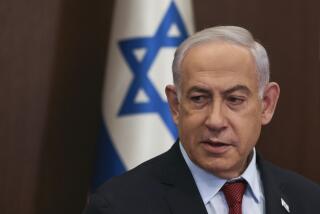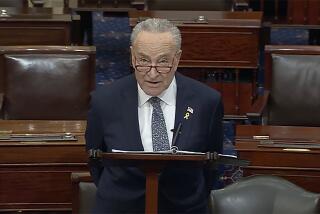Israel’s president begins meetings that will lead to new government
Israeli President Reuven Rivlin began consultations Sunday with representatives of the country’s political parties as a prelude to naming the head of a new government, presumably incumbent Benjamin Netanyahu.
Although it is widely assumed that Netanyahu will head the next government, it is up to the president to determine who will form a governing coalition. After meeting with the various factions, Rivlin is expected to announce his decision this week.
Before last week’s elections, Rivlin was open about his desire to see a unity government led by Netanyahu’s conservative Likud Party and the more liberal Zionist Union, headed by Isaac Herzog. But with his decisive victory at the polls, Netanyahu has brushed aside that possibility.
Although Rivlin determines who will form a coalition, he has no power to dictate its composition.
The president has called for a swift and transparent process. Security and social challenges, and the urgent need to pass a budget, demand political stability and the swearing in of a new government “as soon as possible,” he said.
On election day, Netanyahu prodded his supporters to counter the “masses of Arabs” converging to vote, sparking wide-spread controversy that reverberated in Washington, prompting President Obama to express concern for Israeli democracy.
The controversy lingered Sunday and echoed in Rivlin’s words.
“This is the time to begin a process of mending and healing in Israeli society” after the stormy political season, Rivlin said.
There is no place for the harsh remarks between Jews and Arabs heard during the elections, he said.
“We live together as citizens in this country,” he said, urging an end to discrimination and incitement.
Rivlin also criticized unspecified remarks by an unspecified “senior Israeli official,” which was widely taken to be Netanyahu.
The first to arrive at the president’s residence in Jerusalem were delegates from Likud, which, at 30 seats, will be the largest faction in Israel’s 120-seat parliament.
Next to arrive were members of the Zionist Union, the main opposition party, whose leader, Herzog, had been given a good chance of unseating Netanyahu.
Forming a government could take as long as six weeks, but the most obvious coalition would be one that centers on Netanyahu’s Likud and includes all members of the right-wing bloc and one centrist party, offering a comfortable but not huge majority of 67.
Although formal coalition negotiations have not yet begun, potential members of the coalition know who they are and have begun putting out early feelers and floating demands with their conditions for teaming up with Netanyahu and giving him the majority he needs to rule.
Likud officials have indicated the party wishes to keep the main power positions of the defense and foreign ministries, and control other ministries vital to carrying out economic policy and reforms promised to the public.
A particularly key position is the Finance Ministry, which Moshe Kahlon of the centrist Kulanu party may seek as a condition for joining a coalition. His 10 seats are considered essential for Netanyahu to secure a majority.
In the last government, Netanyahu was constantly at odds with his finance minister, Yair Lapid, ultimately bringing down the government by firing him and Justice Minister Tzipi Livni. He needs to avoid any such friction in his next government, Transportation Minister Yisrael Katz told Israel Radio.
“This may in fact be the reason we went to elections and we do not want to return to this situation,” he said.
Consultations with the parties were to continue Monday. After Rivlin receives the official election results Wednesday, he will announce who will form the next government.
Sobelman is a special correspondent.
More to Read
Start your day right
Sign up for Essential California for news, features and recommendations from the L.A. Times and beyond in your inbox six days a week.
You may occasionally receive promotional content from the Los Angeles Times.






